The Official Word: What %^$^&*@ Fight Were Those Judges Watching?
By Cory Schafer, ISKA President
Have you ever watched an MMA fight that goes the distance and, after the decision is announced, you’re so surprised and upset that you say to your buddies, “What %$#&* fight were those judges watching?”
Believe me. I understand where you are coming from. Having trained and supervised combat sports officials for almost 30 years, I can now reveal a very simple answer to your question.
The judges are not watching the fight. They are judging it.
I’m not talking semantics here.
There is an important qualitative difference between “watching” and “judging.” My goal here is to help explain that difference and how it can affect our perception about who won and who lost a fight.
Bear in mind, I’m not saying that we don’t face significant challenges regarding how MMA bouts are being judged. Sometimes, the reality is that there are judges who just flat out, get it wrong, a subject I plan to address in my next column: “The Problem With Mma Judging And How We Intend To Fix It.”
For now, though, I want to help fans understand why our perceptions about winning and losing sometimes don’t always match the official decision.
I’m intentionally going to avoid speaking about the extensive training and certification that many officials receive. It does address their qualifications to judge, but fails to explain why their decisions sometimes differ from our perceptions as fans.
Fan’s watch and judges judge… So what’s the difference?
AGENDA
A fan’s agenda is to be entertained. Watching fights is a recreational activity that should be fun.
Comparatively, a judge’s agenda is to fulfill a professional commitment to accurately evaluate the relative effectiveness of each fighter’s performance guided by an established and agreed upon criteria.
FOCUS
A fan’s focus is often split between watching the fight, watching his or her surroundings, engaging in conversation, consuming food and beverages etc. These other activities may heighten enjoyment, but do little to contribute to a thorough evaluation of the action.
Judging is not fun. It requires an almost painful level of focus without distraction, maintained for each second of every round. By judging rather than watching, the judge becomes an active participant in the process rather than merely a witness or spectator.
BIAS
Fans are not required to commit to objectivity but, rather, quite the opposite. We are encouraged to choose a favorite and to anticipate, or hope for a certain outcome. That’s what makes us fans!
Judges must actively guard against expecting, anticipating or predicting any particular result. Judges cannot allow bias based on a comparison of the fighter’s physical appearance or attitude, or by prior knowledge of either fighter. A judge’s job is to simply and objectively observe, without prejudice or preconception, and evaluate the action as it unfolds.
METHOD
When a fight is over, fans generally arrive at their opinions of a decision based on memory of the bout. This leads us to lend far more credit to what occurred in the final round relative to what happened in the earlier rounds. Even if we were to make a determination after each round, we would likely give more credit to what occurred later in a round rather than throughout a round. It’s the nature of memory.
Judges, rather, evaluate a fight as it progresses. They must essentially score every second of each round, and each round as if it were a complete bout. They must commit to a score for each round, and then live with their bout ending totals as a reflection of what occurred throughout a fight.
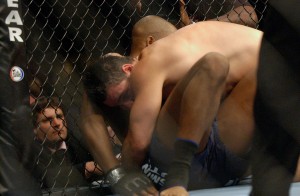
In the background, Judge Doug Crosby (left) carefully observes the action in the cage. Photo Credit: FCFighter.com
Watching a fight is an entertaining recreational activity for which we are encouraged to choose a favorite and cheer this favorite on to victory. We listen, and can be swayed by television commentary, while sharing the experience with our friends. Choosing the winner and voicing our opinion is part of the fun.
Judging a fight is a professional responsibility that requires unbiased and extremely focused effort. Using an established and accepted, common criteria, judges evaluate the relative effectiveness of each fighter’s performance throughout each round. In selecting the winner, the judge’s professional reputation and the fighter’s career are both at stake.
In competitive bouts, it is easy to see how watching and judging may occasionally lead each to different results. That being said, I’ll defend each fan’s right to disagree, and to voice that disagreement.
In my mind, we earn that right by paying the price of admission, or by supporting the sport on television by tuning in. The sport would be in real trouble if the fans didn’t care enough to disagree.
At the end of the day though, for each bout contested, there are only three people who are supposed to be putting 100 percent of their efforts, 100 percent of the time, into the difficult task of evaluating the action. Everyone else has other agendas (fans cheer, commentators comment and coaches coach). These three people, who have the best seats in the house, are also among the best trained to make the call. They are allowed no distractions and can be held accountable for their decisions.
Way more often than not, they get it right.
They’re judging; we’re watching.
About ISKA President Cory Schafer:
- Strikeforce Rules Director, 2006-2011.
- K-1 USA Chief Official, 2001-2005
- Commissioner for Chuck Norris’ World Combat League, 2005-2008
- ISKA President, 1997-present
- Director of the US OPEN World Martial Arts Championships as seen on ESPN



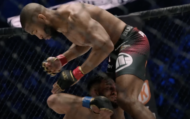

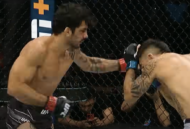

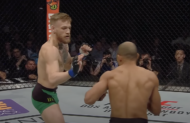

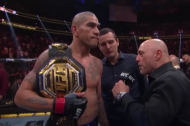

UMMMMMMM no…… this article is nice and all that , but it still does not excuse some of the scoring by judges such as Cecil Peoples, Adelaid Byrd, Doc Hamilton. To somehow suggest that these judges have a superpower to see the fight in a way that the averae fan cannot is laughable. It is giving the judges an easy out on some of the blatantly wrong decisions over the past few years. I would actually say that on the whole the dedicated mma fan is more educated and is able to get a higher percentage of fights scored correctly due to their dedication and following of the sport as fans, as opposed to judges who show up because “they were assigned to the show”. These judges normally get their positions due to beings friends of a guy in a high postion as opposed to being an expert on the sport.
Hi Bill…Thanks for your input. I agree that officials don’t have any superpowers and I also agree that there are some serious problems with the way that some mma bouts are judged, but as often as not the problem is with the scoring system rather than the scorer (which I hope to make clear in my next article). I also agree that many dedicated fans could indeed become great judges, but that begins with their willingness to commit to a different way of experiencing the fights (and a further willingness to be abused for the effort – lol).